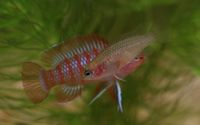Difference between revisions of "Dario dario"
From The Aquarium Wiki
m |
m |
||
| Line 36: | Line 36: | ||
|max_water_hardness=15 | |max_water_hardness=15 | ||
}} | }} | ||
| − | + | ||
| − | + | == Sexing == | |
| + | :Sexing the ''Dario dario'' is much easier than compared to other aquarium fish species. Males are roughly 30% larger than females, growing to around 1 inch in length and displaying the vivid red stripes associated with this fish. Adult males also display bright blue stripes along the leading edge of their pelvic fins. | ||
:Females do not display such color and are rarely seen to reach more than 1/2 inch in length. They are a light grey color and do not have fins as large as males. | :Females do not display such color and are rarely seen to reach more than 1/2 inch in length. They are a light grey color and do not have fins as large as males. | ||
| − | + | ||
| − | + | ||
| − | + | == Tank compatibility == | |
| + | :Best kept with peaceful, robust fish that are not overly active nor will out-compete the Scarlet Badis to its dinner, such as [[Harlequin Rasbora]]s or [[Corydora]]s. Male Scarlet Badis may be territorial towards one another, so they are best kept in male/female pairs or one male with several females. They may also be territorial towards similar-looking fish, which may include [[Dwarf Cichlids]]. | ||
| + | |||
| + | |||
| + | == Diet == | ||
| + | :Dario species are micro-predators feeding on small aquatic crustaceans, worms, insect larvae and other zooplankton. They can be a little picky in the aquarium and may not accept dried foods although in some cases they will learn to take them over time. At any rate they should always be offered regular meals of small live or frozen fare such as [[Artemia nauplii]], [[Daphnia]], grindal, micro and chopped [[bloodworm]] in order to develop ideal colour and conditioning. | ||
| + | |||
| + | |||
{{Categories | {{Categories | ||
|Category=Fish, Fish (Freshwater), Oddballs | |Category=Fish, Fish (Freshwater), Oddballs | ||
Revision as of 03:15, 13 December 2017
Scarlet Badis
Dario dario
38 Litres (10 US G.)
2-3cm (0.8-1.2 ")
Freshwater
6.5 - 7.5
22.2-25.6°C (72 -78 °F)
5-15 °d
1:1 M:F
3-6 years
Family
Badidae
Error creating thumbnail: Unable to save thumbnail to destination |
You can contribute to the Aquarium Wiki by expanding this article. Dont be shy!. |
Contents
Additional names
- Scarlet Badis
Additional scientific names
- Badis badis bengalensis, Badis dario, Labrus dario
Sexing
- Sexing the Dario dario is much easier than compared to other aquarium fish species. Males are roughly 30% larger than females, growing to around 1 inch in length and displaying the vivid red stripes associated with this fish. Adult males also display bright blue stripes along the leading edge of their pelvic fins.
- Females do not display such color and are rarely seen to reach more than 1/2 inch in length. They are a light grey color and do not have fins as large as males.
Tank compatibility
- Best kept with peaceful, robust fish that are not overly active nor will out-compete the Scarlet Badis to its dinner, such as Harlequin Rasboras or Corydoras. Male Scarlet Badis may be territorial towards one another, so they are best kept in male/female pairs or one male with several females. They may also be territorial towards similar-looking fish, which may include Dwarf Cichlids.
Diet
- Dario species are micro-predators feeding on small aquatic crustaceans, worms, insect larvae and other zooplankton. They can be a little picky in the aquarium and may not accept dried foods although in some cases they will learn to take them over time. At any rate they should always be offered regular meals of small live or frozen fare such as Artemia nauplii, Daphnia, grindal, micro and chopped bloodworm in order to develop ideal colour and conditioning.
